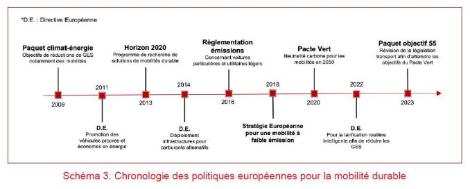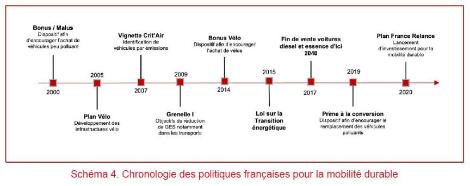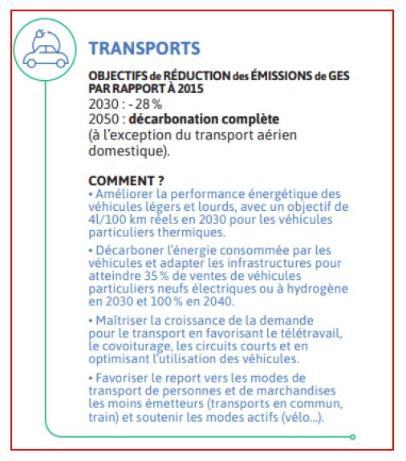Major public policies for sustainable mobility
mars 2024
The European Union is committed to achieving carbon neutrality by 2050, in line with the Paris agreements. For the transport and mobility sector, this means reducing greenhouse gas emissions by more than 90%. This has major implications in terms of public policy and governance for European states, regions and cities, which will all become players in this process. What stage has France’s national strategy reached?
At European level: major objectives and measures for sustainable mobility
The European Union is responsible for sustainable mobility as part of its environmental commitments. It signed the Paris Agreement as an entity, committing itself to act jointly with its Member States, accepting shared responsibility. Although it cannot act directly in terms of urban transport policy because of the principle of subsidiarity, it supports the efforts of national and local authorities by providing guidance, sharing experience and providing funding to encourage more sustainable mobility. The European Union’s focus on sustainable mobility is not limited to transport, but also covers energy policies, air quality, and economic, social and environmental cohesion. Over the years, a number of actions and measures have been put in place to promote the decarbonisation of mobility:

In 2020, the European Union published its strategy for sustainable and intelligent mobility:
2030 targets
▪ 30 million zero-emission vehicles on Europe’s roads
▪ Doubling of high-speed rail traffic
▪ Carbon neutrality of planned collective journeys of less than 500km
▪ Large-scale deployment of automated mobility
2050 targets
▪ Carbon neutrality of new cars, vans, buses and heavy commercial vehicles
▪ Commissioning of the Trans-European Multimodal Transport Network (TEN-T) equipped for sustainable and intelligent transport with high-speed connectivity.
b) At national level: the State, investor and partner of local authorities
Over the years, the French government has put in place a number of initiatives and measures to improve and decarbonise the range of transport services available in the country:

The National Low-Carbon Strategy (SNBC)
The National Low Carbon Strategy (SNBC) is France’s roadmap for reducing its greenhouse gas (GHG) emissions by 2050. It concerns all sectors of activity and must be supported by everyone: citizens, local authorities and businesses. One of the key areas is the transport sector.
To this end, it outlines the following objectives:

This strategy is in line with the guidelines set out in the Mobility Act, which calls for massive investment in innovation to provide local authorities with new alternatives to the car. Local authorities have been invited to play an active role in setting up and co-financing these initiatives.
Its implementation is based on the following measures:
-
Promoting clean vehicles: France is encouraging the adoption of low-emission vehicles, such as electric vehicles and plug-in hybrids. Financial incentives are in place to encourage the purchase of these vehicles, including purchase subsidies and tax breaks.
-
Development of charging infrastructure: Efforts are being made to develop a network of charging points for electric vehicles. This includes the installation of public charging points in urban areas, car parks and motorways, as well as support for the deployment of residential charging points.
-
Promoting public transport and car-sharing: The strategy aims to encourage the use of public transport, such as buses, trams and trains, as well as car-sharing. Investments are being made to improve public transport networks, develop car-sharing infrastructure and facilitate access to shared mobility services.
-
Transition to sustainable biofuels: France is encouraging the use of sustainable biofuels, such as biodiesel and ethanol produced from renewable sources. This aims to reduce dependence on fossil fuels and limit CO2 emissions linked to the fuels used in transport.
-
Spatial planning: Measures are being taken to promote sustainable urban planning, by encouraging the construction of housing close to public transport, the creation of cycle paths and the establishment of low-emission zones in urban centres.
-
Research and innovation: France supports research and innovation in the field of sustainable transport. Investments are being made in the development of new propulsion technologies, improving the energy efficiency of vehicles and exploring innovative mobility solutions.